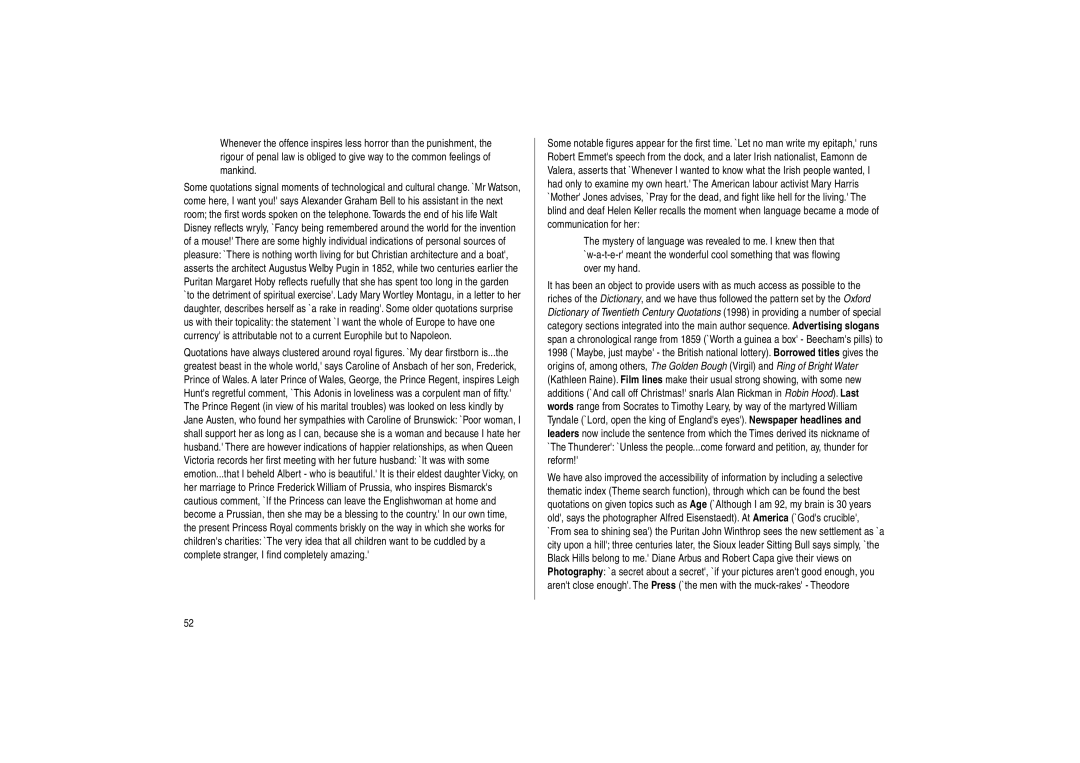Whenever the offence inspires less horror than the punishment, the rigour of penal law is obliged to give way to the common feelings of mankind.
Some quotations signal moments of technological and cultural change. `Mr Watson, come here, I want you!' says Alexander Graham Bell to his assistant in the next room; the first words spoken on the telephone. Towards the end of his life Walt Disney reflects wryly, `Fancy being remembered around the world for the invention of a mouse!' There are some highly individual indications of personal sources of pleasure: `There is nothing worth living for but Christian architecture and a boat', asserts the architect Augustus Welby Pugin in 1852, while two centuries earlier the Puritan Margaret Hoby reflects ruefully that she has spent too long in the garden `to the detriment of spiritual exercise'. Lady Mary Wortley Montagu, in a letter to her daughter, describes herself as `a rake in reading'. Some older quotations surprise us with their topicality: the statement `I want the whole of Europe to have one currency' is attributable not to a current Europhile but to Napoleon.
Quotations have always clustered around royal figures. `My dear firstborn is...the greatest beast in the whole world,' says Caroline of Ansbach of her son, Frederick, Prince of Wales. A later Prince of Wales, George, the Prince Regent, inspires Leigh Hunt's regretful comment, `This Adonis in loveliness was a corpulent man of fifty.' The Prince Regent (in view of his marital troubles) was looked on less kindly by Jane Austen, who found her sympathies with Caroline of Brunswick: `Poor woman, I shall support her as long as I can, because she is a woman and because I hate her husband.' There are however indications of happier relationships, as when Queen Victoria records her first meeting with her future husband: `It was with some emotion...that I beheld Albert - who is beautiful.' It is their eldest daughter Vicky, on her marriage to Prince Frederick William of Prussia, who inspires Bismarck's cautious comment, `If the Princess can leave the Englishwoman at home and become a Prussian, then she may be a blessing to the country.' In our own time, the present Princess Royal comments briskly on the way in which she works for children's charities: `The very idea that all children want to be cuddled by a complete stranger, I find completely amazing.'
Some notable figures appear for the first time. `Let no man write my epitaph,' runs Robert Emmet's speech from the dock, and a later Irish nationalist, Eamonn de Valera, asserts that `Whenever I wanted to know what the Irish people wanted, I had only to examine my own heart.' The American labour activist Mary Harris `Mother' Jones advises, `Pray for the dead, and fight like hell for the living.' The blind and deaf Helen Keller recalls the moment when language became a mode of communication for her:
The mystery of language was revealed to me. I knew then that
It has been an object to provide users with as much access as possible to the riches of the Dictionary, and we have thus followed the pattern set by the Oxford Dictionary of Twentieth Century Quotations (1998) in providing a number of special category sections integrated into the main author sequence. Advertising slogans span a chronological range from 1859 (`Worth a guinea a box' - Beecham's pills) to 1998 (`Maybe, just maybe' - the British national lottery). Borrowed titles gives the origins of, among others, The Golden Bough (Virgil) and Ring of Bright Water (Kathleen Raine). Film lines make their usual strong showing, with some new additions (`And call off Christmas!' snarls Alan Rickman in Robin Hood). Last words range from Socrates to Timothy Leary, by way of the martyred William Tyndale (`Lord, open the king of England's eyes'). Newspaper headlines and leaders now include the sentence from which the Times derived its nickname of `The Thunderer': `Unless the people...come forward and petition, ay, thunder for reform!'
We have also improved the accessibility of information by including a selective thematic index (Theme search function), through which can be found the best quotations on given topics such as Age (`Although I am 92, my brain is 30 years old', says the photographer Alfred Eisenstaedt). At America (`God's crucible', `From sea to shining sea') the Puritan John Winthrop sees the new settlement as `a city upon a hill'; three centuries later, the Sioux leader Sitting Bull says simply, `the Black Hills belong to me.' Diane Arbus and Robert Capa give their views on Photography: `a secret about a secret', `if your pictures aren't good enough, you aren't close enough'. The Press (`the men with the
52
